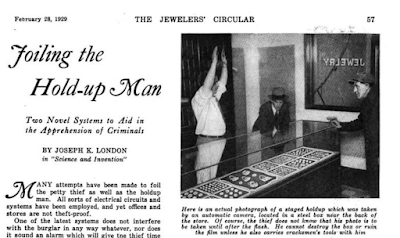It's my great pleasure today to feature a guest post by my friend Josh Pachter. He's practically a regular here at SleuthSayers lately anyway, but in case you don't know, Josh was the 2020 recipient of the Short Mystery Fiction Society's Golden Derringer Award for Lifetime Achievement, and after fifty-five years of selling short fiction to EQMM, AHMM, and elsewhere, his first novel Dutch Threat was published this September. He's also the editor of some twenty anthologies, including six (so far!) books of stories inspired by the songs of singer/songwriters and the films of the Marx Brothers, most recently Happiness Is a Warm Gun: Crime Fiction Inspired by the Songs of the Beatles. Welcome back, Josh!
— John Floyd
The Storia Story
by Josh Pachter
There's a new market for short genre fiction in town, and since I've been involved with it from pretty close to the beginning my buddy John Floyd has asked me to drop by today and tell you about it.
On July 24 of this year, I got the following out-of-the-blue email from someone named Todd Gallet.
Reaching out to see if you might be interested/available for a paid collaboration on our new immersive reading app launching this fall. Storia's vision is to transform reading into a fun, immersive and entertaining routine with a fresh new format for the Gen-Z audience. With a mix of reading, 2D/3D animation, audio, and tactile experiences, we're reinventing the way the mobile generation reads. We are looking to partner with a writer like yourself on an original short story (~2-3K words) for the app. Our story categories include SciFi, Fantasy, Horror, Action/Adventure, and Mystery.
I'd love to schedule a brief intro call to discuss the project in more detail. I look forward to hearing from you. Thanks!
I Googled Todd, of course, and learned that he's an actor out in La-La Land, and Googling "Storia" brought up a bare-bones placeholder web page, nothing more. The pitch was intriguing, but I thought it had a whiff of scam to it, so I cautiously replied to Todd's email requesting more information and cut-and-pasted it to the Short Mystery Fiction Society's listserv, asking if anyone else had gotten the same email I'd received.
Several of us had (John, Stacy Woodson, and Bill McCormick), while some others I would have expected to have been contacted hadn't been (such as Michael Bracken and Rob Lopresti).
Todd wrote back promptly and answered my questions satisfactorily, and I wound up having a couple of enjoyable FaceTime conversations with him. Before sending him any of my fiction, though, I asked to see the contract he intended to ask contributors to sign. He sent it, I read through it carefully and wrote back to say that I thought it was one-sided in favor of Storia, and asked for about a dozen changes . . . all of which were promptly made.
John, Stacy, Bill, and I met several times via Zoom--with Bill calling in from his temporary home in Latvia!--and given the revised contract we agreed that it would be worth giving Storia a try.
All four of us have now sold Todd's company one to three stories, and we were all paid the promised amount remarkably quickly. The Storia app doesn't launch until December, so we haven't yet seen the final product, but some brief animation samples that were subsequently posted to the website and some character sketches John received suggest that the quality is going to be solid and that we'll wind up happy with the way our work has been treated.
With all that backstory in place, let me tell you now what Storia is looking for and what they're offering.
As Todd said in his original email, they're buying genre fiction that runs between two and three thousand words (although the website now suggests that they'll consider stories up to four thousand words.). As we went back and forth by email and FaceTime, I learned that a successful story will begin and end with action that can be animated, and that there'll be animatable moments every couple to four hundred words. Stories can be written in first or third person, past or present tense. Including dialogue is fine, but less talking and more action is better than more talking and less action.
For an original story, the company is paying a flat fee of a thousand dollars, no royalties, and what they want in return is a permanent exclusive license to use the story in their app. The authors retain the right to include the story in collections of their own short fiction, and it can be reprinted in a year's-best collection, but otherwise Storia owns both the story and its characters for the life of the app.
For reprints, the fee is seven hundred and fifty dollars, and the license runs for ten years on the story and three years on the characters.
For both originals and reprints, all rights revert to the author if Storia goes under.
A permanent license for an original and ten years for a reprint are lengthy terms, and that might well turn some writers off. On the other hand, I know that I've sold more than a hundred short crime stories over the last fifty years, and only once have I ever been paid a thousand bucks for a single story . . . while I've sold many stories, especially to anthologies in recent years, for a twenty-five-dollar advance against royalties that never materialized. And I don't think I've ever written a story that paid me anything close to seven hundred and fifty dollars in reprint rights over any given ten-year period.
One cautionary note: since Storia buys not only the rights to your story but also to its characters, I recommend against sending them a series story unless you change the names of the characters first.
Also, be aware that the company may ask for revisions--generally to punch up the action scenes--and may ask you to submit the story with the dialogue presented in basic script format.
FLOYD (puzzled)
You mean like this?
PACHTER (patiently)
Exactly, John. (he points to the screen) Just like I'm showing you here.
Go to storia.io for more information and a look at some of the company's early character designs and animation samples. You'll also find links for both writers and animators to submit their work (and, if you look closely, thumbnail headshots of John, Stacy--and Michael Bracken, who apparently has now connected with them, after all!) and a "Request Access" button that'll put you in line for early access to a limited amount of free content when the app launches in (if all goes according to plan) December.
Storia seems very interested in building ongoing relationships with writers, and Todd has reached out to me several times to ask me to submit more stories, and most recently he asked if I'd be interested in adapting existing public-domain fiction for the Storia platform.
It remains to be seen whether or not the market will welcome another attempt at presenting short fiction via a smartphone app--anyone remember Great Jones Street?--but at a thousand dollars a story paid in actual money and not just vague promises, this is a bandwagon the Sayers of the Sleuth might well consider jumping on.





























